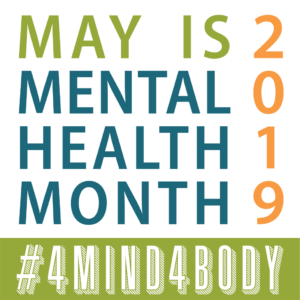With Alcohol Awareness Month behind us, this is an excellent time to pivot to mental illness as a whole. May is Mental Health Month! The nonprofit Mental Health America (MHA) has been celebrating this vital observance for 70 years.
Working with various affiliates, MHA is committed to helping millions of Americans to see that mental health is worth consideration. The myriad psychological disorders affecting millions of Americans, young and old, impacts us all. A society is only as healthy as its most vulnerable citizens.
43.8 million adults experience mental illness in a given year. To put it another way, 1 in 5 adults in America experience a mental illness, according to the National Alliance on Mental Illness (NAMI).
The Substance Abuse and Mental Health Services Administration (SAMHSA) reports that nearly 60% of adults with a mental illness didn’t receive mental health services in the previous year. Despite evidence-based treatments, most people are unable to access these for several reasons. Stigma and shame stand in the way of therapy quite often in the United States.
Men and women who struggle with conditions like depression face enormous obstacles. Without access to available treatments, the risk of self-medicating and engaging in self-harm is high. Using drugs and alcohol to manage the symptoms of psychological issues is a risky business. Using mind-altering substances to cope can lead to addiction and result in an overdose.
According to the National Institute of Mental Health (NIMH), approximately 10.2 million adults have co-occurring mental health and addiction disorders. A dual diagnosis is when a person meets the criteria for an alcohol or substance use disorder and another form of mental illness.
Raising Mental Health Awareness
Taking care of the mind is as vital as physical wellness. The truth is that both facets of human beings are inextricably connected. Mental well-being depends on physical health, and vice versa. During Mental Health Month, one of the key messages is prioritizing a healthy lifestyle. Eating right and exercising can prevent symptoms from worsening and can help people heal.
At PACE Recovery Center, we stress to our clients the importance of recognizing the mind-body connection. Abstinence is of vital importance, but healing is multidimensional. To keep the disease of addiction in remission, one must maintain mental, physical, and spiritual balance.
Making small changes to daily routines can go a long way in recovery. Since healing is a process, lifestyle alterations happen gradually. In addiction and mental health recovery, small changes can be the impetus for continued progress.
This year’s Mental Health Month theme is #4Mind4Body. Spirituality, recreation, and work-life balance are critical for everyone but may be more vital to individuals dealing with mental illness. Mental Health America states that:
Finding balance between work and play, the ups and downs of life, physical health and mental health, can help you towards focusing both #4Mind4Body.
There are several ways that Americans can have a hand in helping raise awareness. MHA offers a toolkit that can assist organizations in hosting events. People in mental health recovery can use social media to spread the message: “mental health is something everyone should care about.”
Helping Others Boost Mental Health and General Wellness
In the social media age, the average American can reach thousands of people with just a few clicks. While most Facebook and Twitter posts are relatively trivial, such platforms can be harnessed for good.
If you would like to help spread the word, then MHA offers some stock social media posts, including:
We need to speak up early and educate people about #mentalillness—and do so in a compassionate, judgment-free way. Download @mentalhealthamerica’s 2019 toolkit to help raise awareness at bit.ly/MayMH. #4Mind4Body #MHM2019
You are also welcome to create unique posts and utilize the above hashtags. The key messages below can help you design your posts:
- Mental health is essential to everyone’s overall health and well-being, and mental illnesses are common and treatable.
- A healthy lifestyle can help to prevent the onset or worsening of mental health conditions, as well as chronic conditions like heart disease, diabetes, and obesity. It can also help people recover from these conditions.
- Finding a reason to laugh, going for a walk, meditating, playing with a pet, or working from home once a week can go a long way in making you both physically and mentally healthy.
Looking Past Stigma, Finding Support
Mental illnesses, ranging from addiction to post-traumatic stress disorder, are treatable. When people find the strength to seek help, they can heal. Still, those suffering from mental health conditions need everyone’s encouragement.
When society has open, honest, and fact-based discussions about mental illness, myths and misconceptions fade away. When psychological distress is viewed through the prism of compassion rather than judgment, people seek help. We can all play a part in eroding the mental health stigma.
Please contact PACE Recovery Center to learn more about our mental health and dual diagnosis treatment. Our gender-specific programs help male clients manage mental health conditions and heal from trauma. Males struggling with substance use disorders and behavioral health issues can and do recover.



